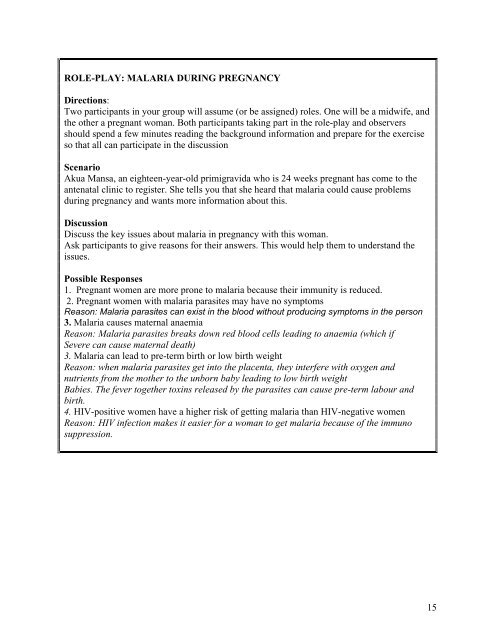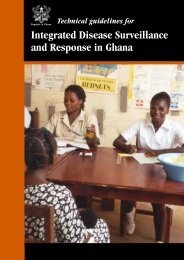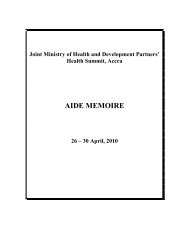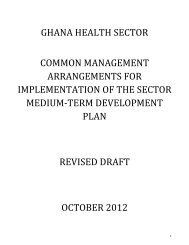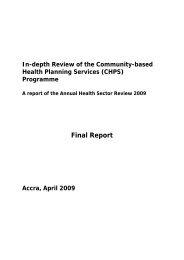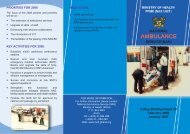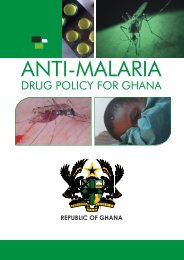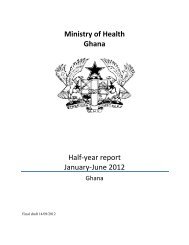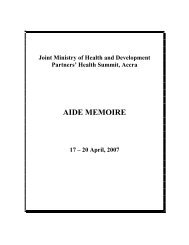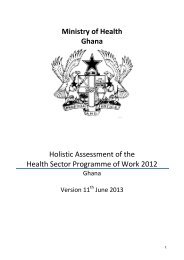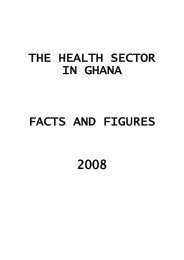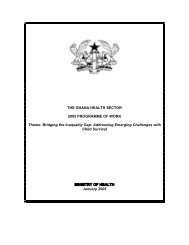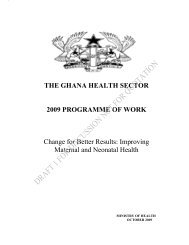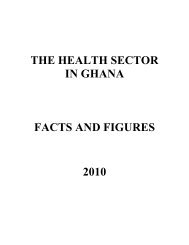Training Manual for Preventive Malaria - Ministry of Health
Training Manual for Preventive Malaria - Ministry of Health
Training Manual for Preventive Malaria - Ministry of Health
You also want an ePaper? Increase the reach of your titles
YUMPU automatically turns print PDFs into web optimized ePapers that Google loves.
ROLE-PLAY: MALARIA DURING PREGNANCY<br />
Directions:<br />
Two participants in your group will assume (or be assigned) roles. One will be a midwife, and<br />
the other a pregnant woman. Both participants taking part in the role-play and observers<br />
should spend a few minutes reading the background in<strong>for</strong>mation and prepare <strong>for</strong> the exercise<br />
so that all can participate in the discussion<br />
Scenario<br />
Akua Mansa, an eighteen-year-old primigravida who is 24 weeks pregnant has come to the<br />
antenatal clinic to register. She tells you that she heard that malaria could cause problems<br />
during pregnancy and wants more in<strong>for</strong>mation about this.<br />
Discussion<br />
Discuss the key issues about malaria in pregnancy with this woman.<br />
Ask participants to give reasons <strong>for</strong> their answers. This would help them to understand the<br />
issues.<br />
Possible Responses<br />
1. Pregnant women are more prone to malaria because their immunity is reduced.<br />
2. Pregnant women with malaria parasites may have no symptoms<br />
Reason: <strong>Malaria</strong> parasites can exist in the blood without producing symptoms in the person<br />
3. <strong>Malaria</strong> causes maternal anaemia<br />
Reason: <strong>Malaria</strong> parasites breaks down red blood cells leading to anaemia (which if<br />
Severe can cause maternal death)<br />
3. <strong>Malaria</strong> can lead to pre-term birth or low birth weight<br />
Reason: when malaria parasites get into the placenta, they interfere with oxygen and<br />
nutrients from the mother to the unborn baby leading to low birth weight<br />
Babies. The fever together toxins released by the parasites can cause pre-term labour and<br />
birth.<br />
4. HIV-positive women have a higher risk <strong>of</strong> getting malaria than HIV-negative women<br />
Reason: HIV infection makes it easier <strong>for</strong> a woman to get malaria because <strong>of</strong> the immuno<br />
suppression.<br />
15


